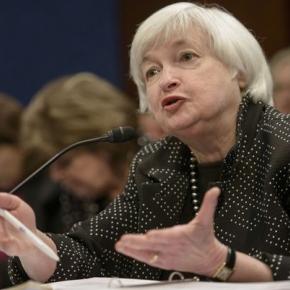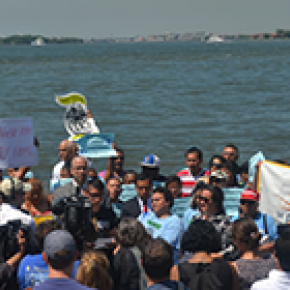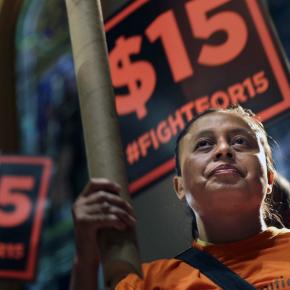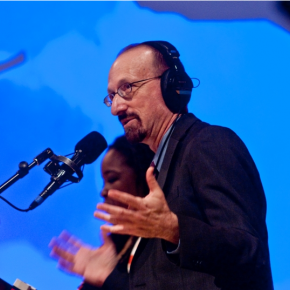Hold the Fed Accountable: Opposing View
USA Today - March 17, 2015, by Mark Weisbrot - Should the Federal Reserve raise interest rates in order to create more...
USA Today - March 17, 2015, by Mark Weisbrot - Should the Federal Reserve raise interest rates in order to create more unemployment and keep wages from rising? If the question were asked that way, the vast majority of Americans would say, "No!"
It is not posed in this manner, even though economists — including Fed economists — and many journalists who write for the business press know that this is exactly what the Fed will be doing when it raises interest rates.
Of course, the justification is that we "need" to do this in order to keep inflation from rising to harmful levels. But the Consumer Price Index is actually down slightly for the year ending in January; in other words, inflation is in negative territory. Why should anyone want to increase unemployment just to keep inflation down?
OUR VIEW: Why it's good news if Fed loses 'patience'
When the Fed increases unemployment, it increases it twice as much for African Americans as for everyone else. And higher unemployment also reduces wage growth much more for African-American workers and lower-wage workers. Across the board, more unemployment translates very directly into more income inequality.
This is no time to be increasing unemployment and inequality, and pushing down wages. Median household income in the U.S. is still down about 3% since the recession ended in mid-2009. For the vast majority of the workforce, wages have stagnated or declined since 1979. Meanwhile, in the first three years of the current economic recovery, the top 1% of Americans received 91% of all income gains.
Fortunately, for probably the first time in the Fed's century of existence, there is a grass-roots movement to hold America's central bank accountable to the voters, citizens and working people of this country. A coalition led by the Center for Popular Democracy is "Fed Up" and trying to make sure that the Fed doesn't cut off wage growth before it even gets rolling.
If America is to shed the title of "Land of Inequality," this is how it is going to happen: by more people becoming aware of how the Fed's monetary policy affects them and demanding that it change.
Source
Progressive Activists Take A Seat For The People At Federal Reserve Retreat

Progressive Activists Take A Seat For The People At Federal Reserve Retreat
Two years ago this week, the nonprofit Center for Popular Democracy and allied groups launched the Fed Up campaign,...
Two years ago this week, the nonprofit Center for Popular Democracy and allied groups launched the Fed Up campaign, aimed at making the Federal Reserve more accountable to workers and communities of color. They converged then on the Jackson Lake Lodge in Wyoming, where Fed officials decamp every year to discuss policy and hobnob with the economic elite.
How much political headway has the campaign made since then? This year, Fed Up activists were essentially put on the schedule for senior Federal Reserve officials, with a major meeting at the Jackson Hole summit.
The group met Thursday, the first day of the summit, with eight of the 12 presidents of the regional Federal Reserve banks and two members of the Federal Reserve Board of Governors.
Fed Up activists have met individually with the governors and regional bank presidents before; they spoke with some Fed officials less formally at the past two Jackson Hole gatherings. This is the first time, however, that their delegation of some 120 rank-and-file activists had met with so many of the central bank’s decision-makers in one place.
“It is kind of like a mini-FOMC,” said Fed Up campaign manager Jordan Haedtler prior to the event, likening it to a meeting of the Federal Open Market Committee, the Fed’s policymaking body.
The progressive campaign is calling for the central bank to wait for the economic recovery to reach more broadly across America before raising its benchmark interest rate again, a move that slows the pace of economic growth to head off price inflation.
It has also criticized the Fed for the lack of racial, gender and professional background diversity among its senior officials, arguing that only a central bank that looks like America can craft policy in the best interests of all citizens.
The Fed officials at the meeting were Esther George, president of the Federal Reserve Bank of Kansas City, which hosts the annual symposium; New York Fed president William Dudley; Dallas Fed president Robert Kaplan; Minneapolis Fed president Neel Kashkari; Cleveland Fed president Loretta Mester; Boston Fed president Eric Rosengren; San Francisco Fed president John Williams; Richmond Fed president Jeffrey Lacker, and Fed governors Stanley Fischer and Lael Brainard.
“They were really impressed with how well prepared we were,” said Haedtler after the meeting. “They were heartened by the discussion.”
“We’ll see how things go in September,” he added, referring to the next opportunity for an interest rate hike.
Bill Medley, a spokesman for the Kansas City Fed, also gave positive feedback about the meeting.
“It was a productive dialogue, as it always is, and we look forward to continuing the conversation,” Medley said.
Fed Up has had a banner year so far. Democratic presidential nominee Hillary Clinton embraced the broad contours of its platform in May after weeks of private discussion with group representatives.
“Secretary Clinton believes that the Fed needs to be more representative of America as a whole as well as that commonsense reforms — like getting bankers off the boards of regional Federal Reserve banks — are long overdue,” a Clinton spokesman said at the time.
But Clinton stopped short of signing on to a bolder reform proposal that Fed Up rolled out in April, which would turn the central bank system into an entirely public institution. The Federal Reserve Board of Governors is already a federal agency, whose top officials are nominated by the president and confirmed by the Senate. But the 12 regional banks it supervises are owned by the private financial institutions they serve. (Fed Up released a more detailed version of its idea on Monday.)
The private nature of these banks is a major reason why they are run overwhelmingly by white men with backgrounds in finance, Fed Up argues. There has never been a black or Latino president of one of the regional banks, the group notes in its reform proposal, and one-third of the current bank heads are alumni of Wall Street power player Goldman Sachs.
Fed Up’s moment at this year’s Jackson Hole symposium was not without its hiccups.
Earlier this month, Fed Up were informed that the Jackson Lake Lodge had canceled over a dozen of its room reservations. The hotel said a “computer glitch” had led to the overbooking of 18 rooms. But the fact that 13 of those rooms were booked by Fed Up raised concerns that they were being targeted.
Although the activists found lodging at a nearby resort, Fed Up filed a complaint with the U.S. Department of Justice, and members of Congress sympathetic to their cause sent Fed Chair Janet Yellen a letter asking for an explanation.
In an apparent gesture of detente, George, the Kansas City Fed president, offered Fed Up the big meeting, and the campaign withdrew its objections to the lodging snafu.
Fed Up agreed also to limit its presence in the lodge’s halls during a scheduled cocktail hour. In the past, activists have clustered inside the hotel to confront Fed officials in person. The group held a press conference-cum-rally outside the lodge before Thursday’s meeting. It also plans to run teach-in seminars and to canvass the city’s low-income neighborhoods to spread the word about Fed reform.
But Haedtler, Fed Up’s campaign manager, wanted to focus on Thursday’s meeting. It is evidence, he said, that his fledgling movement’s priorities have made it into the mainstream.
“We have clearly reshaped the discourse,” Haedtler said.
By Daniel Marans
Source
Black Community Seeks the Power of the Ballot
For black communities in the United States, presidential election participation rates are strong and momentum is...
For black communities in the United States, presidential election participation rates are strong and momentum is building.
In 2012, black voters showed up at the polls in the largest numbers (66.2 percent) and voted at a higher rate than non-Hispanic whites (64.1 percent) for the first time since rates were published by the U.S. Census Bureau in 1996.
Black Americans tend to vote Democratic in presidential elections. This was true by historic margins in President Barack Obama's 2008 and 2012 victories
- 95 and 93 percent, respectively. And their turnout rate in 2016 could be an important factor in deciding the next president of the United States, especially in a tight race.
That's good news for black community leaders who want to ensure their voices are heard and hold future leaders accountable.
The 2014 and 2015 cases of deadly police force against unarmed African-Americans have galvanized a tech-savvy generation of activists to inject new life in an age-old push for racial, economic and social equality.
More and more, movements such as Black Lives Matter are becoming international household names and are holding candidates accountable to specifically address and push for legislation on these issues.
One such organization, Black Alliance for Just Immigration (BAJI), engages and advocates on behalf of African-American and black immigrant communities on issues of racial justice and immigrant rights.
BAJI's policy and legal manager, Carl Lipscombe, says part of the greater push nationwide to organize and bring to light instances of police brutality results from what he describes as a community-wide fear of "being killed when walking to the corner." He says these police cases are enhanced by the advent of social media and by the ability to capture events on camera that wasn't possible in the 1980s.
Lipscombe says candidates must do more than "throw a bone" if they expect communities of color to go to the polls in droves.
"It's not enough to just say we want free education for everyone," Lipscombe said. "We want to know how this is going to impact black people."
According to the U.S. Bureau of Labor Statistics, the unemployment rate among blacks in the United States, at 9.4 percent, remains significantly higher
- nearly double
- than the overall rate of 5 percent nationwide.
Black wealth also has declined. The non-partisan Economic Policy Institute, in coordination with the liberal research institution Center for Popular Democracy, reports that black workers' wages have fallen by 44 cents on the hour in the past 15 years, while wages of both Hispanic and white workers have increased by approximately the same amount.
The Migration Policy Institute reports that black immigrants from Africa are better educated than the overall U.S. population, age 25 and older.
In 2007, 38 percent held a four-year degree or more, compared to 27 percent of the U.S. population. Yet, black immigrants earn lower wages and hold the highest unemployment rate in comparison to other immigrant groups, according to the Center for American Progress.
Bakary Tandia, case manager and policy advocate at African Services Committee, a Harlem-based agency dedicated to assisting African immigrants, refugees and asylees, says progress is necessary across all levels of government.
"Even if you take the case of [New York City Mayor Bill] de Blasio," Tandia said, "he is a progressive mayor, but in his administration, I have not seen any African immigrant appointed or in a meaningful position, and the same thing goes at the state level, at the federal level."
Grass-roots coordinators say anti-immigration rhetoric among some presidential candidates has fueled electoral participation, as well as greater community leadership.
Steve McFarland, whose organizing efforts include get-out-the-vote campaigns among disenfranchised communities in New York, says the immigration reform movement, combined with the work of Black Lives Matter, has produced a new generation of civil rights leaders.
"It doesn't look the way that it used to look," McFarland said. "It's not big organizations, but they can mobilize people, they have a clear voice, and they are winning changes across the country."
Ahead of the 2016 presidential primaries, there is good news for Democratic frontrunner and former secretary of state Hillary Clinton. She currently enjoys an 80 percent favorability rating among adult blacks, the highest positive net rating of all candidates, according to a recent Gallup poll.
Clinton, who has met privately with Black Lives Matters activists, specifically addressed racial profiling in an October speech at Clark Atlanta University.
"Race still plays a significant role in determining who gets ahead in America and who gets left behind," Clinton said. "Racial profiling is wrong, demanding, doesn't keep us safe or help solve crimes. It's time to put that practice behind us."
Source: Hong Kong Herald
A Democratic Contender For Florida Governor Appears To Own Millions In Puerto Rican Debt

A Democratic Contender For Florida Governor Appears To Own Millions In Puerto Rican Debt
“If you are running to represent Puerto Ricans, and potentially harming Puerto Ricans through investments, then Puerto...
“If you are running to represent Puerto Ricans, and potentially harming Puerto Ricans through investments, then Puerto Ricans will hold you accountable,” said Julio López Varona of the Center for Popular Democracy, one of the leading activist groups on the Puerto Rican debt crisis. “There’s a question about what are those investments, and if that question is not answered that is extremely concerning.”
Read the full article here.
Undocumented immigrants in New York could become 'state citizens' under new bill
NY Daily News - June 15, 2014, by Erin Durkin - Undocumented immigrants in New York could become “state citizens” with...
NY Daily News - June 15, 2014, by Erin Durkin - Undocumented immigrants in New York could become “state citizens” with a slew of benefits from driver’s licenses to voting rights under a bill to be introduced Monday.
Advocates are set to announce the measure that would allow immigrants who aren’t U.S. citizens to become New York State citizens if they can prove they’ve lived and paid taxes in the state for three years and pledge to uphold New York laws — regardless of whether they’re in the country legally.
The state bill, which would apply to about 2.7 million New Yorkers, will face long odds in Albany, where even more modest immigration reforms have failed to pass.
People who secured state citizenship would be able to vote in state and local elections and run for state office. They could get a driver’s license, a professional license, Medicaid and other benefits controlled by the state. Immigrants would also be eligible for in-state tuition and financial aid.
The legislation would not grant legal authorization to work or change any other regulations governed by federal law.
“Obviously this is not something that’s going to pass immediately, but nothing as broad as this or as bold as this passes immediately,” said Sen. Gustavo Rivera (D-Bronx), the sponsor in the state Senate.
April 15: National Protests on Tax Day Demand Trump Release His Tax Returns

April 15: National Protests on Tax Day Demand Trump Release His Tax Returns
WASHINGTON - Today, the National Working Families Party announced their participation in the Tax Day March. President...
WASHINGTON - Today, the National Working Families Party announced their participation in the Tax Day March. President Trump’s financial ties to Russia are causing growing questions for both Democrats and Republicans. As a result, thousands of people plan to gather in Washington, D.C., on Saturday, April 15, 2017, at 11 a.m. The Tax March was an idea that started on Twitter, but has gained momentum on and offline, with over 135 marches planned in cities across the country...
Read full article here.
Rally scheduled and website started in support for Pittsburgh immigrant in process of being deported

Rally scheduled and website started in support for Pittsburgh immigrant in process of being deported
After City Paper reported the story of Martin Esquivel-Hernandez, an undocumented immigrant from Mexico with no...
After City Paper reported the story of Martin Esquivel-Hernandez, an undocumented immigrant from Mexico with no criminal record who is currently in the process of being deported, CP editor Charlie Deitch called for Pittsburghers to get involved in the fight to keep Esquivel-Hernandez in the Steel City.
And many have responded. On July 8, more than 100 marchers will rally in support of Esquivel-Hernandez and “to oppose the politics of hate and fear,” according to the group’s Facebook page. The supporters are particularly calling out presumptive Republican presidential nominee Donald Trump and Republican U.S. Sen. Pat Toomey, from Pa., for their remarks and actions against undocumented immigrants. (Trump has called Mexican immigrants rapists, and Toomey sponsored a bill to block funding to “sanctuary cities,” or ones that refuse to communicate with the Department of Homeland Security about undocumented immigrants without warrants; the bill was blocked recently by U.S. Senate Democrats.)
In fact, Esquivel-Hernandez was picked up by immigration officers most likely because he had been cited for driving without a valid license in Mount Lebanon, a town without a sanctuary city-like policy. Lt. Duane Fisher, of the Mount Lebanon Police, says the township's general policy is to make contact with U.S. Immigration and Customs Enforcement if police “find someone who is unlicensed” and to see whether ICE has “any reason to see if [the suspect] is wanted.” Fisher says that from there, Mount Lebanon police don’t follow up on the case, and that it becomes ICE’s call. Pittsburgh, while not a sanctuary city, has a policy to not initiate contact with ICE, but will cooperate if contacted.
Immigration will be a main topic at the public march on Friday, which will coincide with the People’s Convention being held Downtown, and begins at 2:30 p.m. at 10th Street and Penn Avenue. For those wishing to provide further support to the Esquivel-Hernandez family, a website has been created (keeptheesquivelfamilytogether.com) where supporters can sign a letter to U.S. District Attorney David Hickton, who is prosecuting the case against Esquivel-Hernandez, that asks Hickton to drop the felony re-entry charges.
The groups rallying around Esquivel-Hernandez include the Pittsburgh chapter of the Labor Council for Latino Advancement, Latino outreach group Casa San José, nonprofit coalition One Pittsburgh, and social-justice-advocacy group the Thomas Merton Center.
A message in support of Esquivel-Hernandez is written on the website: “We sincerely believe Hickton is using this charge to brand Martín as a criminal deserving of jail time and immediate deportation. Martín does not belong in a prison cell. He should be back with his family and the community that loves and needs him the most.”
Esquivel-Hernandez has been in Pittsburgh for more than four years and has been involved in an assessment of Latino needs for Allegheny County; advocated for better translation services in Pittsburgh schools; and marched in immigrant-rights rallies.
The Obama administration has said that it will prosecute undocumented immigrants who threaten public safety, but the advocacy groups claim that Esquivel-Hernandez does not fit into that category given his lack of a criminal record and positive involvement in the community.
Donations can also be given on the website, or people can send a check to Pittsburgh LCLAA with “solidarity with Esquivel family” written on the memo line. Checks can be mailed to:
Pittsburgh LCLAA
United Steelworkers
Attn.: Guillermo Perez
60 Blvd. of the Allies
Pittsburgh, PA. 15222
By Ryan Deto
Source
The big 2016 minimum wage push just got a powerful new ally
A little over a year out from the presidential election, we already know the states where the fiercest battles will...
A little over a year out from the presidential election, we already know the states where the fiercest battles will likely be fought. But another electoral map is shaping up too: The states where voters will decide where to raise their minimum wage.
And soon, those pay-boosting ballot measures might have some serious money behind them. A large California union is seed funding an organization aimed at accelerating such campaigns around the country, seizing on growing public support for raising the minimum wage to heights that just one cycle ago would have seemed like total fantasy.
It’s called the Fairness Project, officially launching Thursday, and it’s already focusing on three jurisdictions: California, Maine and the District of Columbia, with potentially more to come as funding becomes available. And the group's main backer, the Service Employees International Union’s 80,000-person strong United Healthcare Workers local in California, says it’s talking with a handful more.
“This is the best value in American politics,” says SEIU-UHW president Dave Regan, who last year laid out a strategy to raise wages through ballot initiatives in the 24 states that allow them. “If you can amass $25 million, you can put a question in front of half the country that simply can’t be moved through legislatures because of big money in politics.”
The organization doesn’t have $25 million yet, just a couple million; Regan declined to specify exactly how much. SEIU headquarters, despite waging its own multi-million dollar “Fight for $15” campaign to raise wages around the country, has yet to pitch in (which may have something to do with the fact that Regan has had a testy relationship with SEIU’s president, Mary Kay Henry; SEIU declined to comment).
But Regan says he hopes that as union locals do their budgets for the 2016 campaigns, they’ll contribute, partly as a way to resuscitate the labor movement’s image. “Most of the discourse around unions is negative,” Regan says. "So the Fairness Project is saying, 'Look, we can win for tens of millions of people, just if we’re committed to doing this.'"
They’ve picked a soft target. According to the Ballot Initiative Strategy Center, minimum wage measures have been tried 20 times in 16 states since 1996, and all but two succeeded. The earlier victories came in waves, starting with the “living wage” movement in the 1990s. The campaigns even work in conservative states: in 2004, John Kerry lost Florida, but a minimum wage hike passed with 70 percent of the vote.
Even though those measures may not have made it through state legislatures, in combination, they do seem to add momentum for minimum wage hikes on the federal level — Congress responded with legislation in 1997 after a spate of ballot initiatives, and again in 2007 and 2008. Sometimes, just the credible threat of a ballot initiative can spur state houses to action where previously they had no interest, although the final result may end up watered down.
Most recently, in 2014, minimum wage measures passed in Arkansas, Alaska, Nebraska, and South Dakota. This latest wave is even more ambitious than the first and second, says Brian Kettenring, co-executive director of the Center for Popular Democracy — and it benefits from the narrative around inequality that arose during an economic recovery that delivered very little wage growth.
"In some ways the most powerful, because it’s the most visionary in terms of the Fight for $15,” Kettenring says. “What the project hits on that really makes sense is engaging inequality through the ballot initiative.”
Still, there’s no guarantee of success, and credible initiative campaigns do take money. They also have a lot of common needs, like polling, voter targeting, Website design, and message strategy. That’s where Ryan Johnson, the Fairness Project’s executive director, says the group can help.
“There are a lot of very expensive things with ballot initiatives,” Johnson says. “Things that work with presidential campaigns — could we take the lead in investing in those directly and at scale? It saves people a couple grand here, and couple grand there.”
It’s a model that’s worked for other causes, as well, such as marriage equality and medical marijuana. The ballot initiative process has long been used by both conservative and liberal groups, with varying degrees of scale, sometimes with the side effect of driving turnout for Democratic or Republican candidates.
The support will help campaigns that usually lack major corporate financing, and have to sustain themselves with volunteers and small dollar donations. Amy Halsted, of the Maine Peoples’ Alliance, says the organization received unprecedented financial support for its push to raise the state’s minimum wage to $12 by 2020 — it has raised about $150,000.
But it could use help with big-ticket items that are more efficiently provided by a central coordinating body, like consulting and tech support. And besides, a national campaign has a galvanizing effect in itself.
“One of the things we’re excited about is their ability to sustain that energy that exists nationally, and try to create an echo chamber,” she says. "The ability to connect all the movements I think is powerful and exciting, and makes our hundreds of volunteers feel connected to a big national campaign.”
The Fairness Project may not even be the only game in town when it comes to national support for minimum wage campaigns. Seattle billionaire Nick Hanauer, who helped bankroll the successful $15 an hour campaign there, isn’t contributing — he thinks the group has got the wrong message. “The majority of workers want the economy to grow,” he wrote in an e-mail, arguing that high wages are good for business. “Growth sells. Complaining about fairness does not.” (Regan says their initial focus groups responded well to the fairness message.)
But Hanauer may be supporting other campaigns independently — including a ballot initiative in his home state of Washington. “We hope to influence the messaging on a lot of the campaigns that will unfold in ’15 and ’16,” he says.
Ballots will likely becrowded with other measures, too — with more and more state legislatures controlled by Republicans, liberal groups are trying to put gun control and marijuana legalization questions before voters directly.
Facing that popular onslaught, the business community is weighing its options.
In some places, like Maine, the opposition might not be that fierce. Although business groups grumbled when the $12 statewide ballot initiative was introduced, the state’s biggest city — Portland — already passed a law that would raise the wage at least that high by 2018. On top of that, they’refighting a city vote on a local $15 minimum.
“$12 is not out of the question here, as long as it's statewide,” said Toby McGrath, who’s running the campaign against the $15 measure for the Portland Chamber of Commerce.
California, however, will see a more pitched battle. Business groups managed to stall a $13 minimum wage hike proposal in the legislature. Tom Scott, California’s state director for the National Federation of Independent Business, says there's still a lot of time yet to build an employer response to the ballot measure that labor backers say just got enough signatures to qualify.
“There’s going to be a huge coalition opposition a minimum wage increase,” he says. “This is a very long process. And the one thing about ballot initiatives — depending on how it’s worded, if it’s a yes or a no, in California, if I can in 15 seconds create confusion or questions, people will typically vote no.”
But if young people vote in large numbers, Scott worries they could be hard to beat. “I would just be fearful of the voter turnout,” he says, "and the demographics of who’s turning out.”
After publication, SEIU headquarters reached out to add the following statement:
SEIU works directly with our local unions in states to evaluate ballot initiatives on a state by state basis and determine which ones will advance better jobs and better wages for working people.
Source: Washington Post
Puerto Rico: Shelter After the Storm
"The members of Congress do not think of Puerto Rico as a part of their constituency and responsibility, and that is...
"The members of Congress do not think of Puerto Rico as a part of their constituency and responsibility, and that is what is underneath this crisis," says Ana Maria Archila from the Center for Popular Democracy. "It is a crisis of democracy as much as it's a climate crisis, as much as it's an economic crisis."
Read the full article here.
2013 Race for Mayor: Low-Income New Yorkers
WNYC - March 1, 2013 - Brian Lehrer hosted a forum with seven mayoral hopefuls "2013 Race for Mayor: What's in it for...
WNYC - March 1, 2013 - Brian Lehrer hosted a forum with seven mayoral hopefuls "2013 Race for Mayor: What's in it for Low-Income New Yorkers?" sponsored by The Community Service Society (CSS) sponsored the event in partnership with Local 32BJ of the Service Employees International Union, the Center for Popular Democracy, and United New York.
Source












29 days ago
29 days ago